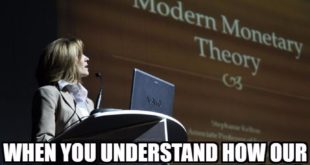The problem with identity politics and wokeism .[embedded content]
Read More »The limited epistemic value of ‘variation analysis’
While appeal to R squared is a common rhetorical device, it is a very tenuous connection to any plausible explanatory virtues for many reasons. Either it is meant to be merely a measure of predictability in a given data set or it is a measure of causal influence. In either case it does not tell us much about explanatory power. Taken as a measure of predictive power, it is limited in that it predicts variances only. But what we mostly want to predict is levels, about which it...
Read More »Economic methodology — Lawson, Mäki, and Syll
Economic methodology — Lawson, Mäki, and Syll We are all realists and we all — Mäki, Cartwright, and I — self-consciously present ourselves as such. The most obvious research-guiding commonality, perhaps, is that we do all look at the ontological presuppositions of economics or economists. Where we part company, I believe, is that I want to go much further. I guess I would see their work as primarily analytical and my own as more critically constructive or...
Read More »Lönerna driver inte inflationen
Lönerna driver inte inflationen Stephanie Kelton har blivit en fixstjärna för vänstern och kritiker till gängse nationalekonomisk teori. I helgen besökte hon Stockholm. Hon är kritisk till hur inflationen bekämpas: ”Räntehöjningar är ett väldigt trubbigt verktyg” … Kelton besöker Stockholm mitt under en internationell inflationskris. Första frågan till henne under intervjun ett par timmar före hennes medverkan på konferensen blir därför hur inflationen...
Read More »Mainstream model fitting
Neo-classical economists getting their models to fit the data. pic.twitter.com/DxvmhR6eil — Rethinking Economics (@rethinkecon) May 20, 2023
Read More »Robert Lucas (1937-2023)
Economic theory, like anthropology, ‘works’ by studying societies which are in some relevant sense simpler or more primitive than our own, in the hope either that relations that are important but hidden in our society will be laid bare in simpler ones, or that concrete evidence can be discovered for possibilities which are open to us which are without precedent in our own history. Unlike anthropologists, however, economists simply invent the primitive societies we study, a...
Read More »Postcolonial theory in perspective
Postcolonial theory in perspective Many of the theoretical assumptions which support the most admirable impulses of the woke come from the intellectual movement they most despise. The best tenets of woke, such as the insistence on viewing the world from more than one geographical perspective, come straight from the Enlightenment. Contemporary rejections of this period usually go hand in hand with not much knowledge of it. But you can’t hope to make progress...
Read More »Vad kan du om ekonomi?
Vad kan du om ekonomi? För att få svar på det kan du ju testa ekonomiquizet i dagens Sydsvenskan!
Read More »Postmodernism & Pedophilia
[embedded content] Jean-Paul Sartre, Roland Barthes, Simone de Beauvoir, Gilles et Fanny Deleuze … Jack Lang … André Glucksmann, et bien d’autres encore; tous font partie des 69 intellectuels français qui, aux côtés de l’écrivain Gabriel Matzneff … ont signé une tribune publiée le 26 janvier 1977. D’abord dans Le Monde puis dans Libération pour défendre trois hommes incarcérés depuis plus de trois ans pour avoir abusé sexuellement de mineurs de moins de 15 ans. ‘Trois...
Read More »Understanding MMT
MMT is, first and foremost, a balance sheet approach to macroeconomics. At its very core lie reserve accounting, then deposit accounting, and then sectoral balances accounting. There is very little behaviour in any of this. Equilibrium rules as all balances balance – in both flows and stocks – and there are no assumptions apart from the existence of a central bank, a Treasury, a banking system and some households and firms. MMT can only be learned by mastering its balance...
Read More » Lars P. Syll
Lars P. Syll






